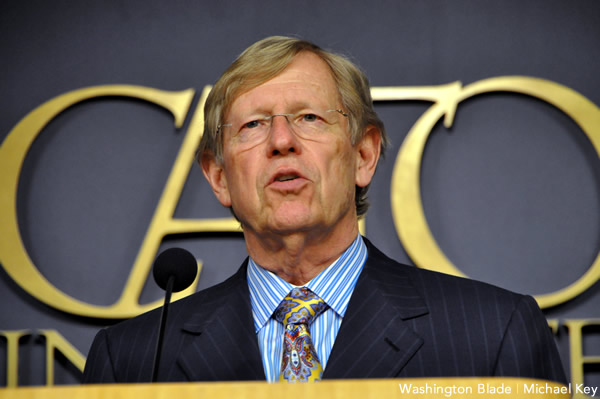National
Prop 8 attorneys confident court will strike down marriage ban
Olson hopes U.S. gov’t will take part in lawsuit


Ted Olson said U.S. government intervention in the Prop 8 case would have “great effect’ on its outcome (Washington Blade file photo by Michael Key)
The organizers behind the lawsuit challenging California’s Proposition 8 are excited and optimistic about the prospects for a Supreme Court ruling against the anti-gay measure as one attorney on the team said he hopes the Obama administration will assist in the effort.
Ted Olson, a co-counsel in the Prop 8 lawsuit, made the remarks during a conference call on Friday in response to a question from Politico’s Josh Gerstein. Olson said a friend-of-the-court brief from the Justice Department would have “great effect” in the effort to overturn Prop 8.
“I would hate to predict what the United States government is doing, but given the stand the president of the United States and the attorney general of the United States made with respect to marriage equality, we would certainly hope that they would participate,” Olson said. “And I’m quite confident that if they did participate, they would support our position in this case because the denial of equal rights is subject to close scrutiny by the courts and cannot withstand that scrutiny.”
Olson said if the Obama administration were to file a brief before the Supreme Court in the Prop 8 case, it would do so at about the same time it would file a brief in the DOMA case. The Justice Department has already filed briefs against DOMA in lower courts.
The Obama administration has thus far stayed out of the Prop 8 case. Asked in September by the Washington Blade whether the U.S. government would weigh in, White House Press Secretary Jay Carney had no comment and Nanda Chitre, a spokesperson for the Justice Department, said, “We are not a party to this litigation and would decline further comment.”
That might change now that the Supreme Court has taken up the case. Like other interested parties, the Justice Department will have an opportunity to file a friend-of-the-court brief in the upcoming days as the court accepts other briefs in the lawsuit.
The organization behind the lawsuit, the American Foundation for Equal Rights, held the conference call in the wake of the Supreme Court’s decision to take up the Prop 8 case as well as one of the cases against the Defense of Marriage Act known as Windsor v. United States.
Olson was confident about a positive outcome for same-sex couples, saying the denial of their marriage rights will receive significant attention simply by being before the Supreme Court.
“We have an exhaustive record on which to build this case, and it will be an education for the American people,” Olson said. “We are very confident the outcome of this case will be to support the rights of our gay and lesbian brothers and sisters.”
David Boies, co-counsel in the lawsuit, said the decision of the Supreme Court to take up the case means only a short time remains before a final resolution is reached in the Prop 8 case.
“We are now literally within months of getting a final resolution of this case that began three-and-a-half years ago,” Boies said. “I think we are encouraged and excited about the prospect that we will finally get a decision on the merits with respect to marriage equality. This is a momentous case; I think the attention that it has already received by the Supreme Court indicates their recognition of the importance of this issue.”
Human Rights Campaign President Chad Griffin, who co-founded AFER, also expressed excitement about the prospects of a victory at the Supreme Court on the conference call.
“Today is nothing short of a milestone moment, quite frankly, for equality,” Griffin said. “We are gratified that the court has taken this challenge to Prop 8. We should also mention the challenge to the ridiculously named Defense of Marriage Act. Millions of loving couples — married and unmarried — have been waiting for their day in court, and now they’re finally going to have it.”
Also taking part in the conference call were the two plaintiff couples in the case: Kris Perry and Sandy Stier, who tried to obtain a marriage license in Alameda County, as well as Jeff Zarrillo and Paul Katami, who tried to obtain a marriage license in Los Angeles.
Had the Supreme Court decided not to take up Prop 8, a U.S. Ninth Circuit Court of Appeals ruling against the measure would have been allowed to stand and same-sex marriage would have returned to California.
But plaintiffs in the case didn’t express disappointment. Asked whether she’s unhappy the Supreme Court took up the case, Perry replied, “You may find this a little surprising: the answer is ‘no’.”
“We’ve always been very patient and understanding of this process,” Perry said. “We always wanted the biggest, boldest outcome possible, and that can only happen if the Supreme Court listens to the case.”
Stier echoed those remarks, saying she feels “zero disappointment,” but instead hope that areas affected by discrimination other than in California will obtain relief as a result of the case.
Also during the conference call, Olson and Boies answered questions about the the Supreme Court’s request for additional briefings on whether opponents of Prop 8 have standing to defend the law in court. California state officials aren’t defending the law in court, and anti-gay groups have taken up defense of the anti-gay measure instead.
Olson said that question may present an opportunity for the Supreme Court to strike down Prop 8 on the grounds that anti-gay groups can’t defend the law in court as opposed to deciding the case on the merits. Such a ruling would abrogate a ruling against Prop 8 from the Ninth Circuit that allowed anti-gay groups and let stand a district court ruling against the measure.
“If the court were to decide this on standing as far as the Perry case is concerned, that would reinstate the 134-page opinion from District Judge Vaughn Walker, which decided all of the issues comprehensively in favor of the constitutional rights of marriage equality,” Olson said.
Asked by Buzzfeed’s Chris Geidner whether attorneys would actively argue that proponents of Prop 8 don’t have standing in court, Boies said that would indeed be the case.
“We will be making the standing argument,” Boies said. “We think the standing argument is strongly supported by existing Supreme Court precedent.”
The Prop 8 attorneys had previously filed a brief with the Supreme Court asking justices not to hear the case, but Olson said during the conference call his team has maintained at the same time that the lawsuit would be “the perfect vehicle” for deciding the right to marriage equality throughout the country.
“Gay and lesbians and all citizens have the right to have this issue … before the court with a fully developed record, with evidence on history, the importance of marriage, the damage done by discrimination and the fact that all Americans will benefit by the fact that people will be treated equally throughout this country to marry the person that they love,” Olson said.
In response to a question from The Huffington Post’s Sam Stein on whether opponents of Prop 8 would be better off if a ruling against DOMA came first, Olson denied sequencing would be a problem, saying, “We have never agreed with those concerns.”
“In short, the record is so complete that we have always felt that if the issue of marriage equality was going to be before the Supreme Court, the Proposition 8 Perry case should be a part of it because it has vastly more developed evidentiary record and specific thoughtful findings by a district judge who listened to all the evidence, and there was no evidence of any persuasive effect on the other side,” Olson said.
The opportunity for the court to hear the Prop 8 lawsuit means the Supreme Court may make a national ruling on same-sex marriage that affects not just California, but every state in the country with a ban on same-sex marriage.
Asked by The Advocate’s Julie Bolcer about scenarios in which a Supreme Court ruling might have an impact outside California, Boies said may justices may issue a ruling with larger reach depending on the way they examine the case.
Boies said if the Supreme Court addresses in its ruling the “fundamental merit” issue of whether discrimination against gays and lesbians is unconstitutional under the U.S. Constitution, that ruling would mean “there would be a fundamental right to marry in every state in the country because obviously the federal Constitution applies to every state in the country.”
Still, Boies said the ruling would be limited to California if justices decide the case on same narrow ground as the Ninth Circuit or simply determine that proponents of Prop 8 don’t have standing to defend the law in court. Even so, Boies said such rulings would establish precedent that would have an impact on other marriage cases throughout the country.
NOTE: An additional quote from Olson was added to this piece following its initial publication that better reflected his confidence the Supreme Court would strike down Prop 8 on its merits.
State Department
State Department releases annual human rights report
Antony Blinken reiterates criticism of Uganda’s Anti-Homosexuality Act

Secretary of State Antony Blinken on Monday once again reiterated his criticism of Uganda’s Anti-Homosexuality Act upon release of the State Department’s annual human rights report.
“This year’s report also captures human rights abuses against members of vulnerable communities,” he told reporters. “In Afghanistan, the Taliban have limited work opportunities for women, shuttered institutions found educating girls, and increasing floggings for women and men accused of, quote, ‘immoral behavior,’ end quote. Uganda passed a draconian and discriminatory Anti-Homosexuality Act, threatening LGBTQI+ individuals with life imprisonment, even death, simply for being with the person they loved.”
Ugandan President Yoweri Museveni last May signed the law, which contains a death penalty provision for “aggravated homosexuality.”
The U.S. subsequently imposed visa restrictions on Ugandan officials and removed the country from a program that allows sub-Saharan African countries to trade duty-free with the U.S. The World Bank Group also announced the suspension of new loans to Uganda.
Uganda’s Constitutional Court earlier this month refused to “nullify the Anti-Homosexuality Act in its totality.” More than a dozen Ugandan LGBTQ activists have appealed the ruling.
Clare Byarugaba of Chapter Four Uganda, a Ugandan LGBTQ rights group, on Monday met with National Security Council Chief-of-Staff Curtis Ried. Jay Gilliam, the senior LGBTQI+ coordinator for the U.S. Agency for International Development, in February traveled to Uganda and met with LGBTQ activists who discussed the Anti-Homosexuality Act’s impact.
“LGBTQI+ activists reported police arrested numerous individuals on the basis of their sexual orientation or gender identity and subjected many to forced anal exams, a medically discredited practice with no evidentiary value that was considered a form of cruel, inhuman, and degrading treatment and could amount to torture,” reads the human rights report.
The report, among other things, also notes Ugandan human rights activists “reported numerous instances of state and non-state actor violence and harassment against LGBTQI+ persons and noted authorities did not adequately investigate the cases.”
Report highlights anti-LGBTQ crackdowns in Ghana, Hungary, Russia
Ghanaian lawmakers on Feb. 28 approved the Promotion of Proper Human Sexual Rights and Ghanaian Family Values Bill. The country’s president, Nana Akufo-Addo, has said he will not sign the measure until the Ghanaian Supreme Court rules on whether it is constitutional or not.
The human rights report notes “laws criminalizing consensual same-sex sexual conduct between adults” and “crimes involving violence or threats of violence targeting lesbian, gay, bisexual, transgender, queer or intersex persons” are among the “significant human rights issues” in Ghana.
The report documents Hungarian Prime Minister Viktor Orbán and members of his right-wing Fidesz party’s continued rhetoric against “gender ideology.” It also notes Russia’s ongoing crackdown against LGBTQ people that includes reports of “state actors committed violence against LGBTQI+ individuals based on their sexual orientation or gender identity, particularly in Chechnya.”
The report specifically notes Russian President Vladimir Putin on July 24 signed a law that bans “legal gender recognition, medical interventions aimed at changing the sex of a person, and gender-affirming care.” It also points out Papua New Guinea is among the countries in which consensual same-sex sexual relations remain criminalized.

The Cook Islands and Mauritius in decriminalized homosexuality in 2023.
The report notes the Namibia Supreme Court last May ruled the country must recognize same-sex marriages legally performed outside the country. The report also highlights the Indian Supreme Court’s ruling against marriage equality that it issued last October. (It later announced it would consider an appeal of the decision.)
Congress requires the State Department to release a human rights report each year.
The Biden-Harris administration in 2021 released a memorandum that committed the U.S. to promoting LGBTQ+ and intersex rights abroad.
The full report can be read here.
National
Same-sex couples vulnerable to adverse effects of climate change
Williams Institute report based on Census, federal agencies

A new report by the Williams Institute at the UCLA School of Law finds that same-sex couples are at greater risk of experiencing the adverse effects of climate change compared to different-sex couples.
LGBTQ people in same-sex couple households disproportionately live in coastal areas and cities and areas with poorer infrastructure and less access to resources, making them more vulnerable to climate hazards.
Using U.S. Census data and climate risk assessment data from NASA and the Federal Emergency Management Agency, researchers conducted a geographic analysis to assess the climate risk impacting same-sex couples. NASA’s risk assessment focuses on changes to meteorological patterns, infrastructure and built environment, and the presence of at-risk populations. FEMA’s assessment focuses on changes in the occurrence of severe weather events, accounting for at-risk populations, the availability of services, and access to resources.
Results show counties with a higher proportion of same-sex couples are, on average, at increased risk from environmental, infrastructure, and social vulnerabilities due to climate change.
“Given the disparate impact of climate change on LGBTQ populations, climate change policies, including disaster preparedness, response, and recovery plans, must address the specific needs and vulnerabilities facing LGBTQ people,” said study co-author Ari Shaw, senior fellow and director of international programs at the Williams Institute. “Policies should focus on mitigating discriminatory housing and urban development practices, making shelters safe spaces for LGBT people, and ensuring that relief aid reaches displaced LGBTQ individuals and families.”
“Factors underlying the geographic vulnerability are crucial to understanding why same-sex couples are threatened by climate change and whether the findings in our study apply to the broader LGBTQ population,” said study co-author Lindsay Mahowald, research data analyst at the Williams Institute. “More research is needed to examine how disparities in housing, employment, and health care among LGBT people compound the geographic vulnerabilities to climate change.”
Read the report
Federal Government
Lambda Legal praises Biden-Harris administration’s finalized Title IX regulations
New rules to take effect Aug. 1

The Biden-Harris administration’s revised Title IX policy “protects LGBTQ+ students from discrimination and other abuse,” Lambda Legal said in a statement praising the U.S. Department of Education’s issuance of the final rule on Friday.
Slated to take effect on Aug. 1, the new regulations constitute an expansion of the 1972 Title IX civil rights law, which prohibits sex-based discrimination in education programs that receive federal funding.
Pursuant to the U.S. Supreme Court’s ruling in the landmark 2020 Bostock v. Clayton County case, the department’s revised policy clarifies that discrimination on the basis of sexual orientation and gender identity constitutes sex-based discrimination as defined under the law.
“These regulations make it crystal clear that everyone can access schools that are safe, welcoming and that respect their rights,” Education Secretary Miguel Cardona said during a call with reporters on Thursday.
While the new rule does not provide guidance on whether schools must allow transgender students to play on sports teams corresponding with their gender identity to comply with Title IX, the question is addressed in a separate rule proposed by the agency in April.
The administration’s new policy also reverses some Trump-era Title IX rules governing how schools must respond to reports of sexual harassment and sexual assault, which were widely seen as imbalanced in favor of the accused.
Jennifer Klein, the director of the White House Gender Policy Council, said during Thursday’s call that the department sought to strike a balance with respect to these issues, “reaffirming our longstanding commitment to fundamental fairness.”
“We applaud the Biden administration’s action to rescind the legally unsound, cruel, and dangerous sexual harassment and assault rule of the previous administration,” Lambda Legal Nonbinary and Transgender Rights Project Director Sasha Buchert said in the group’s statement on Friday.
“Today’s rule instead appropriately underscores that Title IX’s civil rights protections clearly cover LGBTQ+ students, as well as survivors and pregnant and parenting students across race and gender identity,” she said. “Schools must be places where students can learn and thrive free of harassment, discrimination, and other abuse.”
-

 South America4 days ago
South America4 days agoDaniel Zamudio murderer’s parole request denied
-

 Maryland4 days ago
Maryland4 days agoMontgomery County police chief discusses arrest of trans student charged with planned school shooting
-

 Commentary5 days ago
Commentary5 days agoWorld ‘isn’t much different today’
-

 Theater4 days ago
Theater4 days ago‘Amm(i)gone’ explores family, queerness, and faith












